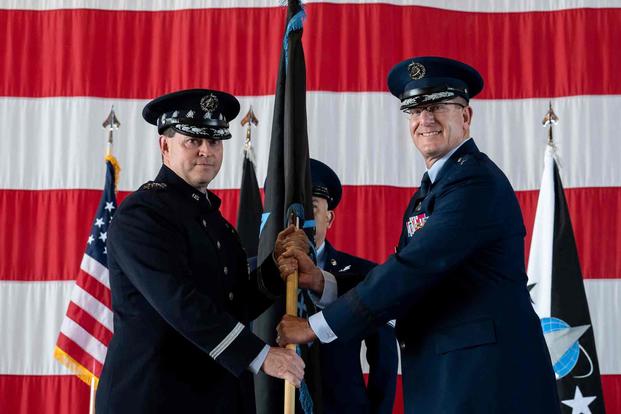COLORADO SPRINGS, Colorado -- For the first time since its inception in 2021, STARCOM -- the command that's responsible for training policy and doctrine for the entire Space Force -- will be led by a Guardian.
Brig. Gen. Timothy Sejba took over the Space Training and Readiness Command from Maj. Gen. Shawn Bratton, an Air Force officer and the first commander of STARCOM, during a ceremony Thursday afternoon at Peterson Space Force Base.
In his new role, Sejba is tasked with preparing 8,600 Guardians for the rigors of space warfare through training and policy. But he said he also owes them a military culture, an important task for a service still working to gain its identity in the eyes of the American public.
Read Next: Alabama Chairman Releases Hold on Air Force Personnel Funds, But Space Command Standoff Continues
"In addition to the skills and expertise we owe Guardians, we owe them an identity and culture," Sejba said during his change-of-command ceremony. "We must foster the Guardian spirit in our institutional training and role-model it during our day-to-day interactions through our character, our connection and courage."
Bratton became the first commander of STARCOM in February 2021, coming mostly from an Air National Guard background. In his role, he oversaw the creation of STARCOM and the development of numerous initiatives, ranging from creating the Space Force's first war college at Johns Hopkins University to originating separate Guardian-focused basic military training at Joint Base San Antonio in Texas.
"My role now is to continue all that good work," Sejba said. "And then certainly we'll have some of our own challenges or opportunities, and those are the things that we're going to focus on."
Sejba's previous role was at Los Angeles Air Force Base, where he was the program executive officer for Space Domain Awareness and Combat Power, according to his service biography. In July, he was nominated for promotion to major general.
Sejba is taking over the command at a pivotal time.
Since 2021, STARCOM has been temporarily headquartered at Peterson Space Force Base in Colorado. In May, the Department of the Air Force selected Florida's Patrick Space Force Base as the preferred permanent location for STARCOM headquarters. The decision is pending an environmental impact analysis, which is "expected to be completed later this year before final decisions are made," according to an Air Force press release.
Sejba said he plans to develop upon Bratton's work, but also told Military.com that more changes and developments to the Space Force's basic military training program aren't out of the question -- such as possibly moving boot camp to an independent basing location.
"I certainly want to build upon that," Sejba said when asked about future BMT plans. "Whether that requires a separate facility somewhere down the road, a different location, I really, at this point, don't have a good understanding or an idea of that."
But one of Sejba's biggest challenges, and one that doesn't have an immediate solution, will continue to be building the service's culture. In the three years since the Space Force became a separate and distinct service branch under the Department of the Air Force, officials have worked tirelessly to build public recognition.
This past September, the Space Force unveiled its first official service song. The tune was met with mixed reviews. Thursday's change of command ceremony concluded with Guardians in attendance singing the song, but most appeared not to know the lyrics or mumbled through them.
Gen. Chance Saltzman, who serves as the head of the service as the chief of space operations, pointed out in a memo this past May that the Space Force needs a clearer and easier to understand mission statement and said he understood why many in uniform can't remember it.
"How many Guardians can recite the current mission statement of the Space Force? My guess is very few," Saltzman wrote. "My biggest concern is that the mission statement does not reflect why the nation has a Space Force and the vital functions Guardians perform."
Bratton, who will be transferring from the Air Force to the Space Force, has been nominated for promotion to lieutenant general for his next assignment as deputy chief of space operations for strategy, plans, programs and requirements at Space Force headquarters in Washington, D.C.
In his outgoing speech from STARCOM on Thursday, Bratton said it will take time to cement the identity and culture of the Space Force but believes the command he led has been instrumental in getting the ball rolling.
"We realize that we can't dictate a culture, but we can create the conditions required to grow the Space Force culture we need," Bratton said in his remarks. "As Guardian culture and identity grows over the decades, we should be able to trace them back here to the start of our team that created the circumstances for the Space Force's culture to take hold."
-- Thomas Novelly can be reached at thomas.novelly@military.com. Follow him on Twitter @TomNovelly.
Related: Space Force's STARCOM HQ Preferred Location Is Florida Base, Service Says












